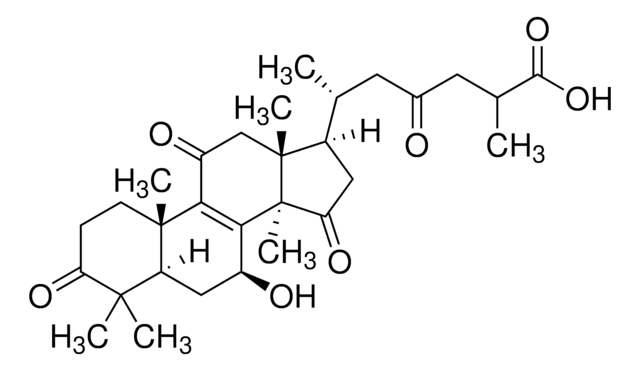P6248
Anti-Parkin antibody, Mouse monoclonal
clone PRK8, purified from hybridoma cell culture
Sinónimos:
Anti-AR-JP, Anti-LPRS2, Anti-PARK2, Anti-PDJ
About This Item
Productos recomendados
origen biológico
mouse
Nivel de calidad
conjugado
unconjugated
forma del anticuerpo
purified immunoglobulin
tipo de anticuerpo
primary antibodies
clon
PRK8, monoclonal
formulario
buffered aqueous solution
reactividad de especies
mouse, rat, hamster, human
concentración
~2 mg/mL
técnicas
microarray: suitable
western blot: 0.25-0.5 μg/mL using using rat brain cytosolic S1 extract
isotipo
IgG2b
Condiciones de envío
dry ice
temp. de almacenamiento
−20°C
modificación del objetivo postraduccional
unmodified
Información sobre el gen
human ... PARK2(5071)
mouse ... Park2(50873)
rat ... Park2(56816)
Descripción general
Inmunógeno
Aplicación
- Enzyme linked immunosorbent assay (ELISA)
- Immunoblotting
- Immunoprecipitation[63}
- Immunocytochemistry
- to label parkin in pull-down assay
Forma física
Cláusula de descargo de responsabilidad
¿No encuentra el producto adecuado?
Pruebe nuestro Herramienta de selección de productos.
Código de clase de almacenamiento
10 - Combustible liquids
Clase de riesgo para el agua (WGK)
WGK 3
Punto de inflamabilidad (°F)
Not applicable
Punto de inflamabilidad (°C)
Not applicable
Equipo de protección personal
Eyeshields, Gloves, multi-purpose combination respirator cartridge (US)
Certificados de análisis (COA)
Busque Certificados de análisis (COA) introduciendo el número de lote del producto. Los números de lote se encuentran en la etiqueta del producto después de las palabras «Lot» o «Batch»
¿Ya tiene este producto?
Encuentre la documentación para los productos que ha comprado recientemente en la Biblioteca de documentos.
Nuestro equipo de científicos tiene experiencia en todas las áreas de investigación: Ciencias de la vida, Ciencia de los materiales, Síntesis química, Cromatografía, Analítica y muchas otras.
Póngase en contacto con el Servicio técnico